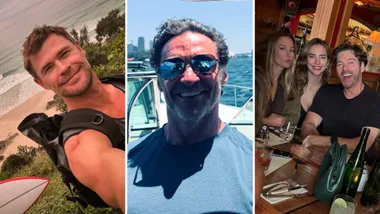If something needs to be done, women just do it, without seeking praise or recognition. In rural and regional Australia, theirs is a vital role in driving economic and social change within communities.
Whether it be paid or unpaid, their work, resourcefulness, imagination and endless perserverance is critical to the rural and national economy, yet women are often undervalued and taken for granted; they can seem to be invisible.
Now some of that work has been recognised in Women In Action, a series of stories about women who have been a major force for change within rural and regional Australia. Here are two stories taken from this collection of women who have made a difference.
Catherine Dendulk
Tasmania
I have been in Devonport, Tasmania for 27 years. I was born in the Netherlands and left there when I was 21. I went to England for a year as an au pair, then migrated to Canada where I lived for 12 years all up. Halfway through my Canadian stay I hitchhiked around the world for four years, two of which were spent in Japan.
I moved to Devonport because of my husband. In Holland, when I was 17-18 we went out together. It did not work out however, and he migrated to Tasmania. While hitchhiking around Australia I visited him and his wife. In 1974, I went back to visit him after his wife died – we decided to get married. He had four children.
In 1981 I became involved in sponsoring and settling refugees. The first were Vietnamese boat people. Devonport Reformed Church sponsored two families. Since then my friend Tea and I have gone on to sponsor many more families including Vietnamese, Czechoslavakian, El Salvadorian and Bosnian. Department of Immigration and Multicultural Affairs (DMA) would ask us to sponsor families for six months which meant we would meet the refugees at the airport, have a house, furniture and food ready for them. Take them to Centrelink, bank, doctor, dentists, schools, you name it, and generally get them used to life in Tasmania. Since the government has changed the system we now work together with the Migrant resource centre if they need help.
Unfortunately the sponsoring was not successful in keeping the refugees here in Tasmania. However it was successful in that we settled them and helped them to fee secure enough to move on. Not being able to find full time employment was the main factor for families leaving Devonport. Especially the Vietnamese, the men and women all wanted full time employment. They were extremely hard workers. Most moved to Melbourne and all have done well – built their own houses. The only group that has stayed here is the El Salvadorians, there’s about 13 or 14 families. Quite a few of these are related and are from the same small town in El Salvador.
The Vietnamese were the most challenging, because they were the first ones, but also because their lifestyle was so different. That is why I enjoyed sponsoring them the most. We had to teach them how to sleep in a bed. We couldn’t understand why they were so cold at night until we found they were sleeping on top of the blankets. We had to teach the parents to use nappies for the babies.
The Devonport Reformed Church wanted it to be a community effort and, once the families arrived, people did help. It was hard for the families and the community because the Vietnamese did not speak English and, at first, we did not even have a dictionary! The families attended English classes so we had to make up a roster for women to look after the children. Overall, the community was supportive.
Lynda Sharples
Northern Territory
I came to Tennant Creek in the early eighties. I am married with four children aged between 16 and 31. When we moved into our home it was the only place in Martin Court. There was nothing for miles. We had no trees, just salt bush and brush. We had just come from Tasmania.
It took a while to adjust. I had not even seen an Aboriginal. It didn’t take me long to fit in and get work because somebody heard I was a hairdresser. I have my own business now – Hair on the Move. I work from our home salon and I have a mobile service too. I have a good customer base and I think it is successful. I do go to the nursing home. I have Aboriginal clients and I need to be sensitive to their needs and wishes. I never thought I could have my own business, and I don’t see myself as being a successful businesswoman, I love what I do.
During my youngest’s pregnancy, I was alerted to my medical crisis. I had a pap smear, the hospital forgot to tell me. At four months, the hospital decided to ask me who my oncologist was – I had no idea what they were talking about. I survived the cancer. I did not stop the pregnancy. I returned to Tasmania to a hospital and doctor of my choice, and spent seven months there.
This medical crisis was a huge thing for me, it made me push for a Pap Smear Register. I worked behind the scenes making phone calls and writing letters to make sure that this would not happen again. We have our Pap Smear register now but I do not attribute that to me. I can say that I was pushing quietly and talking to the right people. I asked for the register during the lawsuit; it was part of the settlement. I did not want the money. I wanted a register for women. I just kept saying that’s what I want – I will go national and I wills cream, if you don’t do it. All of a sudden a Pap Smear Register appeared.
As a hairdresser I hear lots of privileged things. My role is to hear what people want and need and find the right people to make things happen. I do this in confidence to both parties and don’t want any kudos. I do face some difficulties in providing community support. I have found people like to knock tall poppies. You are going to get that sometimes in a small town – it becomes like a big family, of course families do fight, they get jealous at times, it is all just human nature.
When I include people in community activities I am giving them an opportunity to meet other people that I know in different areas. You don’t need recognition to be successful. You need self-satisfaction that you have done something good that day, and the day after that, and that I often think to myself: ‘Yesterday’s history. Tomorrow’s a mystery. Today is a gift.’
Copies of Women Taking Action are available free of charge from the Regional and Rural Women’s Unit of the Department of Transport and Regional Services on 02 6274 7328.











